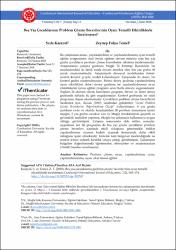Beş Yaş Çocuklarının Problem Çözme Becerilerinin Oyun Temelli Etkinliklerle İncelenmesi
Abstract
Bu çalışmanın amacı, yapılandırılmış ve yapılandırılmamış oyun temelli eğitim programının okul öncesi eğitime devam etmekte olan beş yaş grubu çocukların problem çözme becerilerine etkisinin incelenmesidir. Araştırmanın çalışma grubunu Muğla İli Menteşe İlçesindeki bir anaokulundaki üç farklı sınıfa devam etmekte olan beş yaş grubu 46 çocuk oluşturmaktadır. Araştırmada deneysel modellerden öntest-sontest kontrol gruplu model kullanılmıştır. Çalışmada iki deney bir kontrol grubu oluşturulmuştur. Birinci deney grubuna yapılandırılmış oyun etkinlikleri, ikinci deney grubuna ise yapılandırılmamış oyun etkinliklerini içeren eğitim programı sekiz hafta süreyle uygulanmıştır. Toplam 24 oturum olarak hazırlanan program, birinci ve ikinci deney grubunda haftada üç gün uygulanmıştır. Kontrol grubunda ise rutin programın dışına çıkılmamıştır. Çocukların problem çözme becerilerini incelemek için, Arslan (2012) tarafından geliştirilen “Genel Problem Çözme Becerilerini Değerlendirme Ölçeği” kullanılmıştır. 6 yaş grubu çockların evde ve okulda karşılaştıkları 20 problem durumunu içeren ölçeğin, 5 yaş grubu çocuklar için ve Muğla örnekleminde geçerlik ve güvenirlik analizleri yapılmış, ölçeğin bu çalışmada kullanmaya uygun olduğu görülmüştür. Çalışma sonucunda elde edilen sonuçlar, uygulanan her iki programın da beş yaş grubu çocukların problem çözme becerileri üzerinde etkili olduğunu göstermekle birlikte yapılandırılmış oyunun hedefe ulaşmak konusunda daha etkili olduğunu işaret etmektedir. Kalıcılık testi bulguları incelendiğinde ise sontest lehine anlamlı farklılık ortaya çıktığı görülmüştür. Çalışmanın bulguları doğrultusunda öğretmenler, ebeveynler ve araştırmacılara yönelik öneriler sunulmuştur. The aim of this study is to examine the effects of an education program including structured and unstructured plays on five-year-old pre-school children’s problem-solving skills. The sample of the study consisted of 46 five-year-old children who were enrolled in three different classes of a pre-school in Mentese country of Muğla city. Pretest-posttest design of experimental research was conducted. The study had two experimental groups and one control group. An education program including structured plays for the first experimental group and unstructured plays for the second experimental group was carried out for eight weeks. The program that was carried out 3 times in a week to the first and second experimental groups was scheduled as 24 sections in total. The routine program was carried out to the control group. In order to examine children’s problem-solving skills, “General Problem-Solving Skills Evaluation Scale” developed by Arslan (2012) was conducted. This scale has 20 problematic situation items that 6-year-old children may face at home or school. Thus, the validity and reliability of the scale for 5-year-old children were assessed and the results proved that this scale was convenient for this study. The results of the study showed that both of the education programs were efficient for problem-solving skills of 5-year-old children. On the other hand, it was found that structured plays were more effective in achieving the goal. A considerable decrease was observed in retention test results. Based on the result, recommendations were presented for teachers, parents, and researchers.
Source
Cumhuriyet Uluslararası Eğitim DergisiVolume
7Issue
2URI
https://doi.org/10.30703/cije.393747https://app.trdizin.gov.tr//makale/TXpJeU56RXhNUT09
https://hdl.handle.net/20.500.12809/7830


















